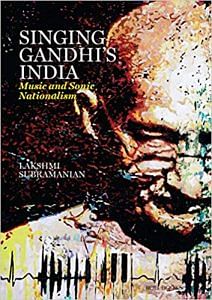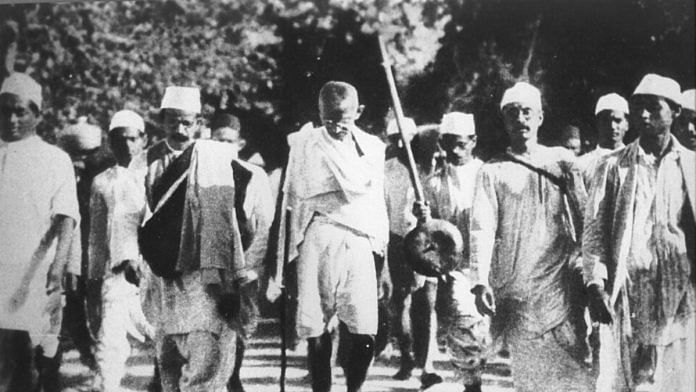At no stage was Gandhi in favour of an exuberant display of emotion that could disrupt social relations and harmony – he saw all musical expression and articulation through the prism of social discipline and personal contemplation. When the controversy over the prabhat pheris or morning musical processions arose, Gandhi was quick to advance his understanding of sonic politics in the 1930s. This was when he insisted on supporting musical processions, claiming that they carried spiritual messages and summoned people to the call of duty.
These songs were explicitly religious and nationalist and he saw no reason to either stop or moderate them. Nor were these apparent contradictions entirely difficult to reconcile. Gandhi’s engagement with music as a political and spiritual resource was not merely strategic, but represented a core component in the articulation of a moral economy of habits and practices that made up a robust, committed moral subject. In fact, in the 1930s and thereafter, Gandhi engaged more openly and directly with the subject of music as a public resource, integrating it with his views on education and as a mode of political communication.
When there was an acceleration of civil disobedience in the 1930s, Gandhi took a strong position on the prabhat pheris that once more raised the issue of noise and its regulation. This time, however, the absence of an explicitly communal element in the activity enabled Gandhi to take an unambiguous stand on the exercise of auditory power in the public domain.
Also read: Gandhi told Gujarat striking millworkers not to be angry at boss or gamble, gossip
The emergence of these spontaneous morning processions where groups of ten to fifteen people assembled to sing songs – mostly patriotic ones – in the 1930s, was a noticeable feature, especially in Bombay and other parts of western India. These musical groups were loosely attached to the Congress organization but for the most part, were informal and independent until in September 1930 they organized themselves into the Akhil Bharat Pheri Sangh with its headquarters in Congress House. Their activities slowly grew in scale so much so that the British police authorities identified them as a potential threat to civic order. The groups themselves simply sang either from memory or from printed sheets and pamphlets, but the government saw the printed matter as seditious material.
One of the interesting aspects of the pheris was their association with local labour and the emergence of small heroes like Hargovind Lalji who led the Pavagadh Vijay Prabhat pheri in Bombay. Even though the pheris rarely seem to have got out of control, they were seen as a nuisance, especially in terms of noise; for the Bombay coroner, the pheris were a source of awful nuisance and were vulgar. The Times of India too spoke out against the hideous noise that the pheris created. The government followed suit when it adopted a hard line against the Congress and declared several bodies allied with the party as illegal, further stating that those pheris that performed seditious songs were to be banned. The pheris responded to this with defiance by continuing with their activities and courting arrest in the process.
With the declaration of the Gandhi–Irwin pact in 1931, when Gandhi and Lord Irwin, then the viceroy of India, signed an agreement mainly to ensure that the British authorities would release Indian political prisoners, pheris resumed their operations. However, they changed tack as they adopted songs in praise of constructive work and social reform, making it difficult for the administration to come down on them. On 25 May 1931, when Gandhi was asked to discourage the pheris, he wrote that he found nothing objectionable in them as they were innocent and did nothing to disturb peace.
On 10 June 1931, he addressed the marching crowds, urging them to finish their daily rounds before sunrise and to sing selected songs of prayer expressing devotion to God and the motherland. This was a clear call for prayer and song as a mark of commitment to the struggle for swaraj and was in marked contrast to his disavowal of music in front of mosques. Whereas the intention of deliberately disturbing prayers in a mosque was suspect, Gandhi found nothing to stop enthusiasts and volunteers from taking up the cause of swaraj, provided they deferred to discipline and unity of action.
Also read: How liberals lost Gandhi as they lost their own intellectual moorings
Gandhi insisted that while he opposed the display of vulgar songs and those that generated hostile emotions, he could hardly restrain the enthusiasm for positive action or for championing – through song – the cause of khadi, deaddiction and constructive work. Just as Gandhi saw music as a valuable resource in channelizing the right fervour or commitment, he saw prabhat pheris as a medium for sponsoring a constructive programme of civic virtue. From being purely spontaneous, they became more formal manifestations of the Gandhian reconstruction programme directed towards the use of khadi and the boycott of foreign cloth. It was during his sojourn in the Yerawada prison, that Gandhi reflected and expressed in writing the value and spiritual ambience that the morning processions provided. As he put it,
they summoned the sleeping to the call of duty. They reminded them that it was time to rise from their beds and give thanks to God the first thing in the morning.
 This excerpt from Singing Gandhi’s India: Music and Sonic Nationalism by Lakshmi Subramanian has been published with permission from Roli Books.
This excerpt from Singing Gandhi’s India: Music and Sonic Nationalism by Lakshmi Subramanian has been published with permission from Roli Books.




I am positive the lap dog could not have survived 200 years more from today. They are broke and Indians got back their spine.